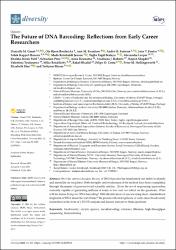The future of DNA barcoding: Reflections from early career researchers

Göster/
Erişim
info:eu-repo/semantics/openAccessTarih
2021Yazar
Grant, Danielle M.Brodnicke, Ole Bjorn
Evankow, Ann M.
Ferreira, Andre O.
Fontes, Joao T.
Hansen, Aslak Kappel
Jensen, Mads Reinholdt
Kalaya, Tugba Ergiil
Leeper, Alexandra
Patil, Shalaka Kiran
Prati, Sebastian
Reunamo, Anna
Roberts, Aradhana J.
Shigdel, Rajesh
Tyukosova, Valentina
Bendiksby, Mika
Blaalid, Rakel
Costa, Filipe O.
Hollingsworth, Peter M.
Stur, Elisabeth
Ekrem, Torbjorn
Üst veri
Tüm öğe kaydını gösterKünye
Grant, D.M., Brodnicke, O.B., Evanow, A.M., Ferre, A.O., Fontes, J.T., Hansen, A.K., Jensen, M.R., Kalaycı, T.E. ...& Ekrem, T. (2021). The Future of DNA Barcoding: Reflections from Early Career Researchers. Diversity-Basel, 13(7), 313. https://doi.org/10.3390/d13070313Özet
Over the last two decades, the use of DNA barcodes has transformed our ability to identify and assess life on our planet. Both strengths and weaknesses of the method have been exemplified through thousands of peer-reviewed scientific articles. Given the novel sequencing approaches, currently capable of generating millions of reads at low cost, we reflect on the questions: What will the future bring for DNA barcoding? Will identification of species using short, standardized fragments of DNA stand the test of time? We present reflected opinions of early career biodiversity researchers in the form of a SWOT analysis and discuss answers to these questions.

















